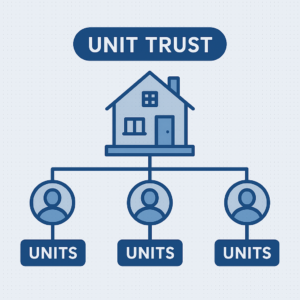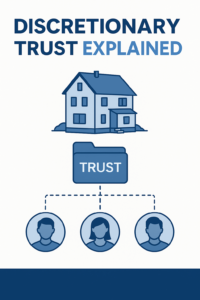Buying Property Through a Company in Australia: Pros, Cons, and Key Tax Considerations
When it comes to property investment in Australia, many investors look beyond simple ownership structures to find one that best suits their long-term goals.
While individuals and trusts are common vehicles, using a company can also be a powerful strategy — especially for those running active businesses or building interrelated investment entities.
A company can provide tax advantages, asset separation, and long-term control — but it also carries specific restrictions and tax implications that must be carefully managed.
Let’s explore what buying property through a company really means, and when it can make sense for you.
💼 What Does It Mean to Buy Property in a Company?
Buying property in a company means the property is legally owned by a corporate entity, not by an individual.
The company appears on the property title as the owner, and it is the company — not you personally — that earns rental income, pays expenses, and declares profits in its own tax return.
The ownership of the company is determined by shareholders, and the company is managed by its directors.
This separation allows for strategic control and asset management — but also adds complexity around finance, tax, and long-term planning.
💰 Tax Efficiency and Retained Earnings
One of the biggest advantages of owning property through a company is the ability to retain earnings at the company tax rate.
In Australia, companies generally pay tax at:
-
25% for base rate entities (turnover under $50 million), or
-
30% for larger companies.
This is significantly lower than the individual top marginal tax rate of 45%.
This means the company can retain more after-tax profits, which can be reinvested or used as deposits for future property purchases — helping accelerate portfolio growth.
However, profits distributed to shareholders later (as dividends) are subject to additional personal tax, although franking credits can reduce the total tax impact.
🏦 Borrowing Capacity and Finance Strategy
From a finance perspective, banks view company structures similarly to trusts:
-
Short-term borrowing capacity is usually lower, as lenders assess both the company’s and the directors’ financials.
-
Long-term borrowing capacity, however, may improve if the company is trading profitably and can demonstrate consistent income supported by accountant-prepared financials.
Some lenders will also disregard existing company loans from the directors’ personal serviceability calculations — provided the company is self-sustaining.
This can be beneficial for investors planning to build multiple properties through different entities without overextending their personal borrowing limits.
🛡️ Asset Protection – Depends on Shareholding
From an asset protection perspective, a company offers separation between personal and business assets.
The property belongs to the company — not to the directors or shareholders personally.
However, the level of protection depends on who owns the shares.
-
If shares are held in a personal name, the asset protection benefit is largely negated — because creditors can target those shares.
-
If shares are held by a discretionary trust, the protection strengthens considerably, as the beneficial ownership is then discretionary and harder to attack.
For business owners or professionals, it’s generally best practice to hold company shares via a discretionary (family) trust rather than personally.
🌏 Land Tax Implications
From a land tax perspective, companies can sometimes provide a real advantage.
In certain states — such as New South Wales — companies receive the same land tax threshold and rate as individuals.
This means no additional surcharge or penalty for owning property through a corporate entity.
However, in other jurisdictions, the thresholds or rates may differ slightly, and some states may treat corporate ownership less favourably, especially for non-resident shareholders.
Always check the land tax treatment in your state before purchasing property through a company.
🧾 Negative Gearing and Loss Utilisation
Unlike individuals, companies cannot distribute losses to their shareholders to offset personal taxable income.
This means that if a property generates a loss — for example, due to interest or expenses exceeding rent — that loss is trapped within the company and can only be used to offset future company profits.
However, there are limited circumstances where interest deductions can still be claimed by shareholders, depending on how the finance and shareholding are structured.
If the company structure and supporting documentation are properly designed, and the shareholder bears the borrowing cost, negative gearing benefits may be partially accessible. This is an advanced strategy requiring specialist accounting and legal advice.
⚠️ No Capital Gains Tax Discount
Perhaps the biggest drawback of owning property through a company is that companies are not eligible for the 50% capital gains tax (CGT) discount.
When an individual or trust sells a property held for more than 12 months, they typically receive a 50% reduction on the capital gain before tax is applied.
Companies do not receive this benefit — all capital gains are taxed at the full company tax rate.
If your intention is to buy and hold long-term growth assets, this lack of CGT discount can have a major impact on after-tax returns.
🔁 Flexibility and Succession Planning
If company shares are owned personally, there’s no flexibility in income or tax distribution — dividends can only go to shareholders in proportion to their shareholding.
However, if the shares are held by a discretionary trust, flexibility increases substantially:
-
The trust can distribute dividends among beneficiaries in a tax-effective way.
-
Future control can be managed by changing the trust’s appointor or trustee, rather than transferring company shares.
This combination — a company owned by a discretionary trust — is one of the most common advanced structures for long-term property and business ownership in Australia.
📘 Example Scenario
Let’s take Olivia, who operates a profitable consulting business through Olivia Holdings Pty Ltd with a discretionary trust as the shareholder.
Instead of purchasing investment property inside her trading company (which would expose it to business risks), Olivia sets up a new investment entity — Olivia Investments Pty Ltd.
The shares in Olivia Investments Pty Ltd are owned by another discretionary trust.
Here’s how it works:
-
Olivia Holdings Pty Ltd pays fully franked dividends to her shareholding discretionary trust.
-
The shareholding discretionary trust then distributes income and franking credits to Olivia Investments Pty Ltd to invest.
-
Using these retained funds (after paying some top up taxes if required), Olivia Investments Pty Ltd purchases investment properties under its name — completely separate from the trading business.
-
The company pays company tax on rental income and can reinvest earnings into new opportunities.
-
When the property is sold, however, no 50% CGT discount applies.
This structure provides asset protection, tax efficiency, and clear separation between business and investment risk — aligning with best-practice principles.
⚖️ Key Advantages
✅ Lower company tax rate (25–30%)
✅ Ability to retain and reinvest earnings
✅ Potentially better land tax treatment in some states
✅ Improved asset protection when shares held by a trust
✅ Professional structure and strong long-term control
❌ Key Disadvantages
🚫 No 50% CGT discount on property sales
🚫 Losses are quarantined in the company (no personal offset)
🚫 Slightly lower borrowing capacity in the short term
🚫 Limited flexibility if shares owned personally
🚫 Additional compliance costs (ASIC, tax returns, bookkeeping)
🧭 When Buying in a Company Makes Sense
Buying property in a company can make sense if you:
-
Run a profitable business and want to retain and reinvest earnings
-
Need asset protection and entity separation
-
Are focused on income-producing properties
-
Have a discretionary trust as the shareholder
-
Plan to build a multi-entity investment structure
It’s less suitable if you:
-
Rely on negative gearing to offset personal income
-
Plan to sell properties for capital gains
-
Want minimal compliance and setup costs
🧠 Trustify Insight
Owning property through a company offers strong structural and tax advantages when used strategically — but it’s not for everyone.
It can be an ideal setup for income-producing investments and multi-entity wealth strategies, especially when combined with a discretionary trust shareholder.
At Trustify, we design structures that balance tax efficiency, asset protection, and scalability — helping clients grow wealth safely and strategically.
Information current as of October 2025. Reviewed by the Trustify Business Advisory Team. General information only — not financial or legal advice.
Others
-
October 20, 2025 Buying Property Under Your Personal Name in Australia: Pros and Cons
-
October 18, 2025 Service Trust Business Structure in Australia
-
October 18, 2025 SPV (Special Purpose Vehicle) Business Structure in Australia




